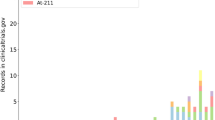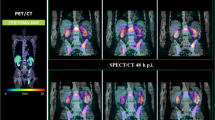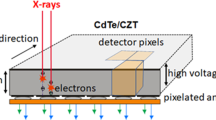Abstract
Purpose
Rats are widely used in biomedical research involving molecular imaging and therefore the radiation dose to animals has become a concern. The weight of laboratory animals might change through emaciation or obesity as a result of their use in various research experiments including those investigating different diet types. In this work, we evaluated the effects of changes in body weight induced by emaciation and obesity on the internal radiation dose from common positron-emitting radionuclides.
Methods
A systematic literature review was performed to determine normal anatomical parameters for adult rats and evaluate how organs change with variations in total body weight. The ROBY rat anatomical model was then modified to produce a normal adult rat, and mildly, moderately and severely emaciated and obese rats. Monte Carlo simulations were performed using MCNPX to estimate absorbed fractions, specific absorbed fractions (SAFs) and S-values for these models using different positron-emitting radionuclides. The results obtained for the different models were compared to corresponding estimates from the normal rat model.
Results
The SAFs and S-values for most source–target pairs between the various anatomical models were not significantly different, except where the intestine and the total body were considered as source regions. For the intestine, irradiating other organs in the obese model, the SAFs in organs in the anterior region of the splanchnocoele (e.g. kidney, liver and stomach) increased slightly, whereas the SAFs in organs in the posterior region of the splanchnocoele (e.g. bladder and testes) decreased owing to the increase in the distance separating the intestine and posterior abdominal organs because of the rat epididymal fat pad. For the total body, irradiating other organs, the SAFs and S-values were inversely related to body weight.
Conclusion
The effect of obesity on internal radiation dose is insignificant in most conditions for common positron-emitting radionuclides. Emaciation increases the cross-absorbed dose to organs from surrounding tissues, which might be a notable issue in laboratory animal internal dosimetry.









Similar content being viewed by others
References
Jönsson BA, Strand SE, Larsson BS. A quantitative autoradiographic study of the heterogeneous activity distribution of different indium-111-labeled radiopharmaceuticals in rat tissues. J Nucl Med. 1992;33(10):1825–33.
Pasqualini R, Duatti A, Bellande E, Comazzi V, Brucato V, Hoffschir D, et al. Bis(dithiocarbamato)nitrido technetium-99m radiopharmaceuticals: a class of neutral myocardial imaging agents. J Nucl Med. 1994;35(2):334–41.
Zaidi H, Xu XG. Computational anthropomorphic models of the human anatomy: the path to realistic Monte Carlo modeling in medical imaging. Annu Rev Biomed Eng. 2007;9(1):471–500.
Lee C, Lodwick D, Hasenauer D, Williams JL, Bolch WE. Hybrid computational phantoms of the male and female newborn patient: NURBS-based whole-body models. Phys Med Biol. 2007;52(12):3309–33.
Hui TE, Fisher DR, Kuhn JA, Williams LE, Nourigat C, Badger CC, et al. A mouse model for calculating cross-organ beta doses from yttrium-90-labeled immunoconjugates. Cancer. 1994;73(3 Suppl):951–7.
Konijnenberg MW, Bijster M, Krenning EP, De Jong M. A stylized computational model of the rat for organ dosimetry in support of preclinical evaluations of peptide receptor radionuclide therapy with 90Y, 111In, or 177Lu. J Nucl Med. 2004;45(7):1260–9.
Xie T, Zhang G, Li Y, Liu Q. Comparison of absorbed fractions of electrons and photons using three kinds of computational phantoms of rat. Appl Phys Lett. 2010;97(3):33702–4.
Flynn AA, Green AJ, Pedley RB, Boxer GM, Boden R, Begent RH. A mouse model for calculating the absorbed beta-particle dose from 131I- and 90Y-labeled immunoconjugates, including a method for dealing with heterogeneity in kidney and tumor. Radiat Res. 2001;156(1):28–35.
Miller WH, Hartmann-Siantar C, Fisher D, Descalle MA, Daly T, Lehmann J, et al. Evaluation of beta-absorbed fractions in a mouse model for 90Y, 188Re, 166Ho, 149Pm, 64Cu, and 177Lu radionuclides. Cancer Biother Radiopharm. 2005;20(4):436–49.
Hindorf C, Ljungberg M, Strand SE. Evaluation of parameters influencing S values in mouse dosimetry. J Nucl Med. 2004;45(11):1960–5.
Stabin MG, Peterson TE, Holburn GE, Emmons MA. Voxel-based mouse and rat models for internal dose calculations. J Nucl Med. 2006;47(4):655–9.
Kolbert KS, Watson T, Matei C, Xu S, Koutcher JA, Sgouros G. Murine S factors for liver, spleen, and kidney. J Nucl Med. 2003;44(5):784–91.
Bitar A, Lisbona A, Thedrez P, Sai Maurel C, Le Forestier D, Barbet J, et al. A voxel-based mouse for internal dose calculations using Monte Carlo simulations (MCNP). Phys Med Biol. 2007;52(4):1013–25.
Dogdas B, Stout D, Chatziioannou AF, Leahy RM. Digimouse: a 3D whole body mouse atlas from CT and cryosection data. Phys Med Biol. 2007;52(3):577–87.
Mohammadi A, Kinase S. Monte Carlo simulations of photon specific absorbed fractions in a mouse voxel pPhantom. Prog Nucl Sci Technol. 2011;1:126–9.
Zhang X, Xie X, Cheng J, Ning J, Yuan Y, Pan J, et al. Organ dose conversion coefficients based on a voxel mouse model and MCNP code for external photon irradiation. Radiat Prot Dosim. 2012;148(1):9–19.
Peixoto PH, Vieira JW, Yoriyaz H, Lima FR. Photon and electron absorbed fractions calculated from a new tomographic rat model. Phys Med Biol. 2008;53(19):5343–55.
Wu L, Zhang G, Luo Q, Liu Q. An image-based rat model for Monte Carlo organ dose calculations. Med Phys. 2008;35(8):3759–64.
Xie T, Liu Q, Zaidi H. Evaluation of S-values and dose distributions for 90Y, 131I, 166Ho, and 188Re in seven lobes of the rat liver. Med Phys. 2012;39(3):1462–72.
Segars WP, Tsui BM, Frey EC, Johnson GA, Berr SS. Development of a 4-D digital mouse phantom for molecular imaging research. Mol Imaging Biol. 2004;6(3):149–59.
Keenan MA, Stabin MG, Segars WP, Fernald MJ. RADAR realistic animal model series for dose assessment. J Nucl Med. 2010;51(3):471–6.
Xie T, Zaidi H. Monte Carlo-based evaluation of S-values in mouse models for positron-emitting radionuclides. Phys Med Biol. 2013;58(1):169–82.
Coop KL, Sharp JG, Osborne JW, Zimmerman GR. An animal model for the study of small-bowel tumors. Cancer Res. 1974;34(6):1487–94.
Nagler R. Extended-term effects of head and neck irradiation in a rodent. Eur J Cancer. 2001;37(15):1938–45.
Thomas R, Thomas RL, Wright S. Retention of cesium-137 and strontium-90 administered in lethal doses to rats. Am Ind Hyg Assoc J. 1968;29(6):593–600.
Stone HB, Moulder JE, Coleman CN, Ang KK, Anscher MS, Barcellos-Hoff MH, et al. Models for evaluating agents intended for the prophylaxis, mitigation and treatment of radiation injuries. Report of an NCI workshop, December 3-4, 2003. Radiat Res. 2004;162(6):711–28.
Larsson E, Ljungberg M, Mårtensson L, Nilsson R, Tennvall J, Strand SE, et al. Use of Monte Carlo simulations with a realistic rat phantom for examining the correlation between hematopoietic system response and red marrow absorbed dose in Brown Norway rats undergoing radionuclide therapy with 177Lu- and 90Y-BR96 mAbs. Med Phys. 2012;39(7):4434–43.
Kennedy G. The role of depot fat in the hypothalamic control of food intake in the rat. Proc R Soc Lond B Biol Sci. 1953;140(901):578–92.
Pass D, Freeth G. The rat. ANZCCART News. 1993;6(4):1–4.
Donaldson HH. The rat: data and reference tables for the albino rat and the Norway rat. New Delhi: Nabu Press; 1915.
Bardia A, Holtan SG, Slezak JM, Thompson WG. Diagnosis of obesity by primary care physicians and impact on obesity management. Mayo Clin Proc. 2007;82:927–32.
Kostanski M, Gullone E. Adolescent body image dissatisfaction: relationships with self-esteem, anxiety, and depression controlling for body mass. J Child Psychol Psychiatry. 1998;39(2):255–62.
Hashimoto PH, Goami Y, Yoneda K, Mori K, Shioyama M, Hasegawa E, et al. Fine structure of rat liver, adrenal, testis and seminal vesicle in experimental emaciation. J Electron Microsc. 1998;47(3):251–62.
Ochi M, Yoshioka H, Sawada T, Kusunoki T, Hattori T. New adipocyte formation in mice during refeeding after long-term deprivation. Am J Physiol. 1991;260(3):R468–74.
Reed LL, Anderson WE, Mendel LB. Factors Influencing the distribution and character of adipose tissue in the rat. J Biol Chem. 1932;96(2):313–23.
Jeanrenaud B, Renold AE. Studies on rat adipose tissue in vitro. J Biol Chem. 1960;235(8):2217–23.
Pelowitz DB. MCNPX user’s manual version 2.5.0. Los Alamos, NM: Los Alamos National Laboratory; 2005. LA-CP-05-0369.
Goldstone KE. Tissue substitutes in radiation dosimetry and measurement. ICRU Report 44. Vol 41. International Commission on Radiation Units and Measurements; 1990.
Valentin J. Basic anatomical and physiological data for use in radiological protection: reference values – ICRP publication 89. Ann ICRP. 2002;32(3-4):5–265.
Xie T, Han D, Liu Y, Sun J, Liu Q. Skeletal dosimetry in a voxel-based rat phantom for internal exposures to photons and electrons. Med Phys. 2010;37(5):2167–78.
Myers R. The biological application of small animal PET imaging. Nucl Med Biol. 2001;28(5):585–93.
Shimoji K, Ravasi L, Schmidt K, Soto-Montenegro ML, Esaki T, Seidel J, et al. Measurement of cerebral glucose metabolic rates in the anesthetized rat by dynamic scanning with 18F-FDG, the ATLAS small animal PET scanner, and arterial blood sampling. J Nucl Med. 2004;45(4):665–72.
Herrero P, Kim J, Sharp TL, Engelbach JA, Lewis JS, Gropler RJ, et al. Assessment of myocardial blood flow using 15O-water and 1-11C-acetate in rats with small-animal PET. J Nucl Med. 2006;47(3):477–85.
Bolch WE, Eckerman KF, Sgouros G, Thomas SR. MIRD pamphlet no. 21: a generalized schema for radiopharmaceutical dosimetry – standardization of nomenclature. J Nucl Med. 2009;50(3):477–84.
Snyder WS, Ford MR, Warner GG, Watson SB. MIRD pamphlet no. 11: ‘S’, absorbed dose per unit cumulated activity for selected radionuclides and organs. New York: The Society of Nuclear Medicine; 1975.
Health Physics Society. Radionuclide decay data. McLean, VA: Health Physics Society. http://hps.org/publicinformation/radardecaydata.cfm. Accessed 21 Jun 2013.
Bardies M, Chatal JF. Absorbed doses for internal radiotherapy from 22 beta-emitting radionuclides: beta dosimetry of small spheres. Phys Med Biol. 1994;39(6):961–81.
Acknowledgments
This work was supported by the Swiss National Science Foundation under grant SNSF 31003A-125246, the Geneva Cancer League and the Indo-Swiss Joint Research Programme ISJRP 138866. The authors thank Dr. W. Paul Segars for providing the ROBY computational rat model.
Conflicts of interest
None.
Author information
Authors and Affiliations
Corresponding author
Rights and permissions
About this article
Cite this article
Xie, T., Zaidi, H. Effect of emaciation and obesity on small-animal internal radiation dosimetry for positron-emitting radionuclides. Eur J Nucl Med Mol Imaging 40, 1748–1759 (2013). https://doi.org/10.1007/s00259-013-2485-9
Received:
Accepted:
Published:
Issue Date:
DOI: https://doi.org/10.1007/s00259-013-2485-9




